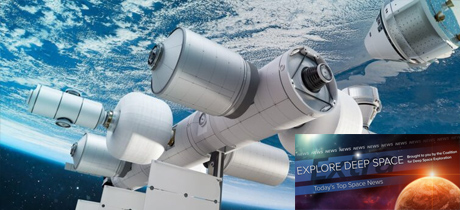In Today’s Deep Space Extra… United Launch Alliance’s Vulcan rocket chosen to launch majority of Amazon’s Project Kuiper satellite constellations. Finding skilled workers remains a challenge for the aerospace industry.
Human Space Exploration
Stuck valve stalls NASA’s 2nd attempt to fuel giant Artemis I Moon rocket
Coalition Member in the News – Axiom Space
Space.com (4/4): For a second day in a row, NASA on Monday was forced to scrub efforts to complete what was initially planned as the two-day Artemis I Wet Dress Rehearsal (WDR), a challenging simulation of the countdown for the first test flight of NASA’s Space Launch System (SLS) and Orion crew capsule. As the WDR fueling procedures progressed into the afternoon, the launch control and mission management teams were confronted by a valve issue on ground equipment. It was unclear how long it might take to resolve the issue and resume the WDR. NASA planned a news briefing on what’s next for Tuesday at 4 p.m. EDT.
NASA plans talks with partners on ISS and Artemis
SpaceNews.com (4/4): The Space Foundation’s Space Symposium underway this week in Colorado Springs offers an opportunity for NASA to meet with international partners on the future of the International Space Station (ISS) as well as efforts under Artemis, according to Pam Melroy, NASA’s deputy administrator. Melroy discussed the opportunity in a one-on-one interview with SpaceNews.com that touched on the challenges related to Russia’s military incursion into Ukraine and sanctions imposed in response by a global community, the new NASA budget request, and more.
Over 4,000 people apply to be astronauts with Japan’s space agency
Japantimes.com (4/5): More than 4,000 individuals, a record, have applied to train as astronauts with the Japan Aerospace Exploration Agency (JAXA). The agency is seeking new astronauts for the first time since 2008 to staff the International Space Station (ISS) and explore the Moon. In order to attract those with a wider range of experience, the Japanese space agency has dropped a requirement that applicants have a university education.
Space Science
Primordial helium, left over from the Big Bang, is leaking out of the Earth
Universetoday.com (4/4): Scientists believe Helium 3, a form of the second lightest chemical element, was forged in the first moments of the Big Bang. Some of the isotope has been discovered slowly escaping from the Earth, offering new clues to the Earth’s formation, its evolution and that of other terrestrial planets.
Other News
Amazon signs multibillion-dollar Project Kuiper launch contracts
Coalition Members in the News – Beyond Gravity, United Launch Alliance
SpaceNews.com (4/5): In the largest commercial launch deal ever, Amazon announced agreements to launch an unspecified number of satellites on Ariane 6, New Glenn, and Vulcan Centaur rockets over five years. Amazon declined to state when the launches would begin. Beyond Gravity, formerly known as RUAG Space, will build satellite dispensers for the Kuiper satellites at a new facility in Sweden. Amazon is buying 38 Vulcan launches from United Launch Alliance (ULA). The agreement includes additional investments in launch infrastructure to support a higher flight rate, such as a dedicated launch platform for Vulcan launches of Kuiper satellites.
Jeff Bezos’ worlds collide: Amazon and AWS join Blue Origin on Orbital Reef space station team
Coalition Members in the News – Boeing, Nanoracks, Northrop Grumman
Geekwire.com (4/4): Orbital Reef is a potential commercial space station successor to the NASA-led International Space Station (ISS) proposed by Blue Origin and which also includes Sierra Space, Boeing, Redwire Space, Genesis Engineering, and Arizona State University. Amazon and its cloud computing division, Amazon Web Services (AWS), have announced their intention to join forces with Blue Origin to develop Orbital Reef.
Space industry struggling to attract more skilled workers
SpaceNews.com (4/4): While showing signs of economic growth, the space industry could find itself struggling to attract workforce talent, according to a Space Foundation presentation on Monday, opening day of the organization’s 37th Space Symposium in Colorado Springs. The industry counted 151,797 people working in 2021, an 18.4% increase over the last five years. The growth is credited to the manufacture of launch vehicles and spacecraft. That good news, though, is tempered by concerns about training new employees, particularly for skilled labor positions like technicians. “There’s a real concern about the labor supply that is available, particularly in precision manufacturing,” said Lesley Conn, director of research and analysis at the Space Foundation.

